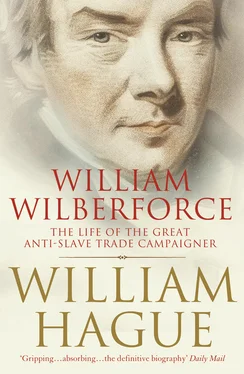WILLIAM
WILBERFORCE
The Life of
the Great Anti-Slave Trade
Campaigner


For Ffion
Cover
Title Page WILLIAM WILBERFORCE The Life of the Great Anti-Slave Trade Campaigner
Dedication For Ffion
Prologue
1 One Boy, Two Paths
2 Ambition and Election
3 The Devoted Acolyte
4 Agony and Purpose
5 Diligence and New Causes
6 The Trade in Flesh and Blood
7 Early Optimism
8 Eloquence Without Victory
9 ‘An Overflowing Mind’
10 The Independent
11 Consuming Passions
12 Darkness Before Dawn
13 Abolition
14 High Respect; Low Politics
15 The Struggle Renewed
16 Under Attack
17 Trials of Faith
18 ‘An Increase of Enjoyments’
19 His Feet on the Rock
Bibliography
Index
The Abolition of the Slave Trade
Notes
Acknowledgements
Praise
By the Same Author
Copyright
About the Publisher
An observer of the House of Commons that Monday afternoon, 23 February 1807, might have thought it a day like any other: the Members walking in and out in the middle of predictable speeches, others sitting facing each other on the tiered green benches, all giving off the hubbub of gossip which was a sure sign that they were waiting for something important and were not enthused by the proceedings before it.
There was, after all, no shortage of subjects for the Members to discuss as they watched and waited. The government of Lord Grenville was at such an impasse in its relations with King George III that its fall from power could be imminent, and the war with France, which over fourteen years had cost tens of thousands of lives and added £350 million to the national debt, seemed deadlocked. If national crisis and European conflict were not enough for them there was plenty of drama closer to home: that morning, at the hanging at Newgate of three convicted murderers, Messrs Holloway and Haggerty and Elizabeth Godfrey, the attendant crowd of twenty thousand had become so tightly packed that thirty spectators had died in the crush. No wonder the MPs that afternoon seemed to pay little attention to the tedious routine of their chamber: a complaint against the Sandwich Road Bill, a committee seeking to take evidence in Ireland, a short debate on the Poor Laws Bill, an alteration of the general election result in Chippenham, all typical of the daily fare of the House of Commons at the beginning of the nineteenth century. Only after all these matters had been considered did the Speaker call for the business that was keenly awaited on the floor of the House and in the public gallery, and ask the Secretary of State for Foreign Affairs, Lord Howick, to move the second reading of the Slave Trade Abolition Bill.
The slave trade had been debated in the same chamber and by many of the same people for nearly two decades. Year after year the evils of the trade, ‘founded in robbery, kidnapping and murder, and affording an incentive to the worst passions and crimes’, 1as Lord Howick was soon to refer to it, had been brought before the attention of MPs. Year after year the Bills proposed had been rebuffed, delayed, abandoned amidst the lengthy taking of interminable evidence or brusquely thrown out in the House of Lords. Once again that Monday afternoon the arguments were deployed. The abolition of the trade would lead to the better treatment of slaves already in the West Indies; the great ports of Liverpool and Bristol were not remotely dependent on it; and most of all, the House of Commons could no longer accept the principle ‘that British subjects are allowed to tear by violence from their home their fellow creatures, to take them from their family, and from their friends, to convert them from free men into slaves, and to subject them for the remainder of their lives to the arbitrary will and wanton caprice of others’. 2Once again, as afternoon wore on into evening and the candles were lit around the chamber for a sitting long into the night, the House had to endure the arguments to the contrary. There was General Gascoyne, the Member for Liverpool and ‘conservative to the backbone’, drawing attention to the capital invested in forty thousand tons of shipping and the employment of four thousand seamen. He warned of mass insurrection among the slaves if the Bill were carried. There was Mr Bathurst of Bristol calling for a tax on the importation of Negroes rather than total abolition, for ‘sufficient notification had not been given’. 3There was George Hibbert of London, who had twenty-five years’ experience of investments in Jamaica, arguing that Africa had ‘invited’ the slave trade rather than ‘the slave trade seduced Africa’. 4For those who had longed for Britain to take the lead in removing ‘one of the greatest sources of crimes and sufferings ever recorded in the annals of mankind’, 5the arguments deployed were a heartrending reminder of the defeats and disappointments of the past.
Yet on this night there was one crucial difference, and everyone present knew it. The Bill would be passed, not merely by a small margin but by a huge one; not then passed into oblivion but this time enacted within a few weeks as the law of His Majesty’s Kingdom and all of his Islands, Colonies, Dominions, and Territories. A nation which had transported over three million Africans across the Atlantic and invested vast sums in doing so would, from 1 May that year, outlaw such a trade and declare any vessel fitted out for it to be forfeit. The Royal Navy, the most powerful on earth, which had henceforth protected that trade, would from that day enforce its annihilation.
This Bill would finally succeed in abolishing the practices of decades and changing the behaviour of an Empire, and the MPs, still in their seats as midnight came on, now knew it. For unlike its predecessors, it came with the full force of a united ministry behind it and had already been passed by the House of Lords, for all the fulminations of the future King, the Duke of Clarence. Its passage would be hailed by the Prime Minister himself as the ‘most glorious measure that had ever been adopted by any legislative body in the world’, 6while the veteran campaigner Granville Sharp would drop to his knees in prayer and thanksgiving: the dam which had held back twenty years of anger, revulsion, education, petitioning, campaigning and parliamentary struggle had finally burst.
When four o’clock in the morning came the Members were still there in force, and in voting 283 for the Ayes and only sixteen for the Noes they would render the close or negative votes of earlier years hard to believe. Yet before they did so, speaker after speaker would single out one of their number as the architect of the victory to come; one who had found twenty years before that the trade was ‘so enormous, so dreadful, so irremediable’ that he had ‘from this time determined that I would never rest till I had effected its abolition’; 7one whose speech against the trade in 1789 was, according to the great Edmund Burke, ‘not excelled by anything to be met with in Demosthenes’; 8and one who through all the dark years of war and revolution since then had persisted in the face of heavy defeats, gnawing and nagging his way to an objective he believed had been set before him by God.
Читать дальше













